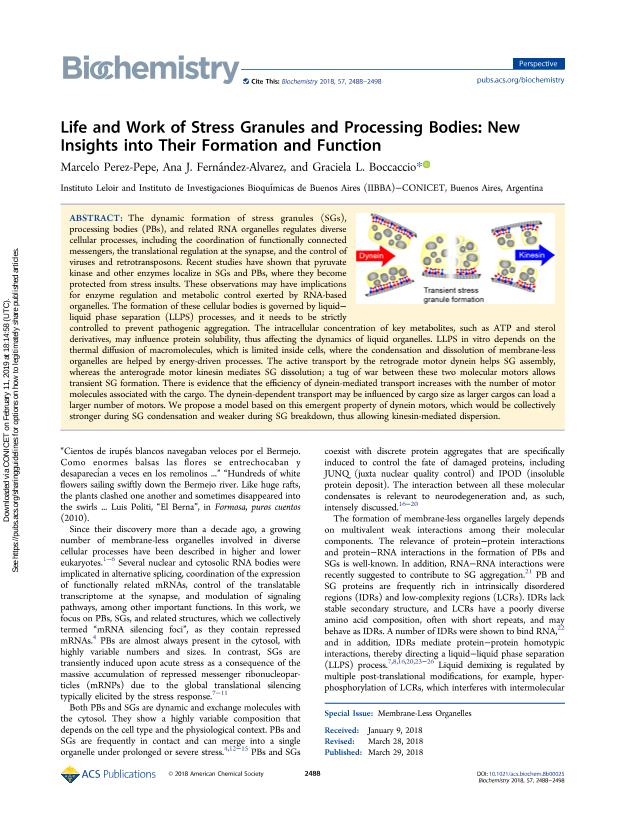Artículo
Life and Work of Stress Granules and Processing Bodies: New Insights into Their Formation and Function
Fecha de publicación:
05/2018
Editorial:
American Chemical Society
Revista:
Biochemistry
ISSN:
0006-2960
Idioma:
Inglés
Tipo de recurso:
Artículo publicado
Clasificación temática:
Resumen
The dynamic formation of stress granules (SGs), processing bodies (PBs), and related RNA organelles regulates diverse cellular processes, including the coordination of functionally connected messengers, the translational regulation at the synapse, and the control of viruses and retrotransposons. Recent studies have shown that pyruvate kinase and other enzymes localize in SGs and PBs, where they become protected from stress insults. These observations may have implications for enzyme regulation and metabolic control exerted by RNA-based organelles. The formation of these cellular bodies is governed by liquid-liquid phase separation (LLPS) processes, and it needs to be strictly controlled to prevent pathogenic aggregation. The intracellular concentration of key metabolites, such as ATP and sterol derivatives, may influence protein solubility, thus affecting the dynamics of liquid organelles. LLPS in vitro depends on the thermal diffusion of macromolecules, which is limited inside cells, where the condensation and dissolution of membrane-less organelles are helped by energy-driven processes. The active transport by the retrograde motor dynein helps SG assembly, whereas the anterograde motor kinesin mediates SG dissolution; a tug of war between these two molecular motors allows transient SG formation. There is evidence that the efficiency of dynein-mediated transport increases with the number of motor molecules associated with the cargo. The dynein-dependent transport may be influenced by cargo size as larger cargos can load a larger number of motors. We propose a model based on this emergent property of dynein motors, which would be collectively stronger during SG condensation and weaker during SG breakdown, thus allowing kinesin-mediated dispersion.
Palabras clave:
stress granules
,
processing bodies
,
molecular motors
,
translation
Archivos asociados
Licencia
Identificadores
Colecciones
Articulos(IIBBA)
Articulos de INST.DE INVEST.BIOQUIMICAS DE BS.AS(I)
Articulos de INST.DE INVEST.BIOQUIMICAS DE BS.AS(I)
Citación
Pérez, Marcelo; Fernández Alvarez, Ana Julia; Boccaccio, Graciela Lidia; Life and Work of Stress Granules and Processing Bodies: New Insights into Their Formation and Function; American Chemical Society; Biochemistry; 57; 17; 5-2018; 2488-2498
Compartir
Altmétricas




